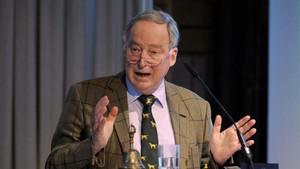ImmigrationGermany’s newly elected populist, far-right AfD: We will fight an “invasion of foreigners”
Leaders of the populist, nationalist AfD party, which entered the Bundestag for the first time after Sunday federal election, have pledged to fight an “invasion of foreigners” with its new MPs. Alexander Gauland, speaking in Berlin the morning after the election results came in, said his party would “uncompromisingly address” immigration, an issue the party has campaigned on since late 2015. “One million people – foreigners – being brought into this country are taking away a piece of this country and we as AfD don’t want that,” Gauland told a press conference late Sunday. “We say we don’t want to lose Germany to an invasion of foreigners from a different culture. Very simple.”

Alexander Gauland, leader of Germany's AfD party // Source: yahoo.com
Leaders of the populist, nationalist AfD party, which entered the Bundestag for the first time after Sunday federal election, have pledged to fight an “invasion of foreigners” with its new MPs.
Alexander Gauland, speaking in Berlin the morning after the election results came in, said his party would “uncompromisingly address” immigration, an issue the party has campaigned on since late 2015.
Despite its gains, the AfD is unlikely to survive in its current form. The party was created in 2013, and since its inception has been an uneasy coalition of traditional conservatives who left the Christian Social Union (CSU), which is the Bavarian affiliate of Chancellor Angel Merkel’s Christian Democrats; blue-collar workers in the declining industrial areas of the former East Germany, and a motley collection of extreme nationalists, neo-Fascists, and neo-Nazis. The party’s leadership includes Holocaust deniers, open anti-Semites, and avowed racists and Islamophobs.
Gauland himself has said many times that German guilt over the Holocaust – the dimensions of which he has consistently questioned – was “over done” (kein anderes Volk habe “so deutlich mit einer falschen Vergangenheit aufgeräumt wie das deutsche” [no other nation “had so clearly been ‘cleaned up’ with a false past as the Germans”] he said in September).
He said that the twelve years under Hitler – 1933-1945 – were not all bad, and that, in any event, Germany for too long had been “obsessed” with the Hitler period and should now let go (“Man muss uns diese zwölf Jahre nicht mehr vorhalten. Sie betreffen unsere Identität heute nicht mehr. Deshalb haben wir auch das Recht, uns nicht nur unser Land, sondern auch unsere Vergangenheit zurückzuholen” [“We do not have to hold on to these twelve years, they no longer affect our identity, so we have the right to bring back not only our country, but our past”]).
He also said that as is the case with the British and the French, “haben wir das Recht, stolz zu sein auf Leistungen deutscher Soldaten in zwei Weltkriegen” (“we have the right to be proud of the achievements of German soldiers in two world wars”).
Earlier this year Gauland said that he would not want to live in the same neighborhood as Jerome Boateng, a right-back for Bayren Munich and the German national soccer team, because Boateng, who was born in Germany to a Ghanaian father and a German father, was black, and hence not a “real” German.
